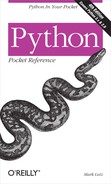This section summarizes Python’s support for Internet scripting.
Following are summaries of some of the more commonly used modules in the Python Internet modules set. This is just a representative sample; see the Python Library Reference for a more complete list.
socketLow-level network communications support (TCP/IP, UDP, etc.). Interfaces for sending and receiving data over BSD-style sockets:
socket.socket()makes an object with socket call methods (e.g.,object.bind()). Most protocol and server modules use this module internally.socketserver(SocketServerin Python 2.X)Framework for general threading and forking network servers.
xdrlibEncodes binary data portably (also see
socketmodules earlier in this list).selectInterfaces to Unix and Windows
selectfunction. Waits for activity on one ofNfiles or sockets. Commonly used to multiplex among multiple streams or to implement timeouts. Works only for sockets on Windows, not files.cgiServer-side CGI script support:
cgi.FieldStorageparses the input stream;cgi.escapeapplies HTML escape conventions to output streams. To parse and access form information: after a CGI script callsform=cgi.FieldStorage(),formis a dictionary-like object with one entry per form field (e.g.,form["name"].valueis form fieldnametext).urllib.request(urllib,urllib2in Python 2.X)Fetches web pages and server script outputs from their Internet addresses (URLs):
urllib.request.urlopen(url)returns file withreadmethods; alsourllib.request.urlretrieve(remote,local). Supports HTTP, FTP, gopher, and local file URLs.urllib.parse(urlparsein Python 2.X)Parses URL string into components. Also contains tools for escaping URL text:
urllib.parse.quote_plus(str)does URL escapes for text inserted into HTML output streams.ftplibFTP (file transfer protocol) modules. ftplib provides interfaces for Internet file transfers in Python programs. After ftp=ftplib.FTP
('sitename'),ftphas methods for login, changing directories, fetching/storing files and listings, etc. Supports binary and text transfers; works on any machine with Python and an Internet connection.poplib,imaplib,smtplibPOP, IMAP (mail fetch), and SMTP (mail send) protocol modules.
emailpackageParses and constructs email messages with headers and attachments. Also contains MIME support.
http.client(httplibin Python 2),nntplib,telnetlibHTTP (web), NNTP (news), and Telnet protocol client modules.
http.server(CGIHTTPServerandSimpleHTTPServerin Python 2.X)xmlpackage,htmlpackage (htmllibin Python 2.X)Parse MXML documents and HTML web page contents.
xmlpackage supports DOM, SAX, and ElementTree parsing models.xmlrpcpackage (xmlrpclibin Python 2.X)XML-RPC remote method call protocol.
uu,binhex,base64,binascii,quopriEncodes and decodes binary (or other) data transmitted as text.
Table 1-24 lists some of these modules by protocol type.
Table 1-24. Selected Python Internet modules by protocol
Protocol | Common function | Port number | Python module |
|---|---|---|---|
HTTP | Web pages | 80 |
|
NNTP | Usenet news | 119 |
|
FTP data default | File transfers | 20 |
|
FTP control | File transfers | 21 |
|
SMTP | Sending email | 25 |
|
POP3 | Fetching email | 110 |
|
IMAP4 | Fetching email | 143 |
|
Telnet | Command lines | 23 |
|
